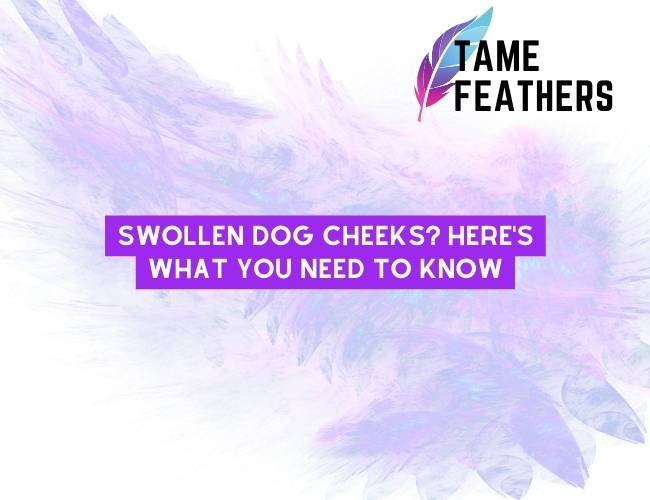Has your pup recently been having swollen cheeks and you aren’t sure what to do? Are you worried about their health and need to know the cause? I understand how it feels to see your pup in discomfort and not understand why. It’s a helpless feeling.
In this article, I’ll explain the common causes of swollen cheeks in dogs and what you can do to help them. We’ll go over symptoms to look out for, possible treatments they may need, and how to keep your pup healthy. By the end of this article, you will have the knowledge you need to make sure your pup is healthy, safe, and comfortable. So let’s get started!
What Causes Swollen Dog Cheeks?
Allergies
Dogs can suffer from allergies just like humans do, and swollen cheeks can be a symptom of an allergic reaction. Common allergens include food, insect bites or stings, pollen, and medications. When a dog comes into contact with an allergen that their immune system sees as a threat, it will release histamines to fight off the perceived danger. These histamines cause inflammation in the body which can result in swelling of various parts including the face.
Infections
Infections are another common cause of swollen dog cheeks. Bacterial infections such as abscesses or periodontal disease can lead to swelling around the mouth area. Viral infections such as canine distemper or herpesvirus may also lead to facial swelling along with other symptoms such as fever and sneezing.
Hormonal Conditions
Hormonal imbalances may also be responsible for swollen dog cheeks. Cushing’s disease is one hormonal condition that can cause puffiness around the face due to excess cortisol production by the adrenal glands. Hypothyroidism is another condition where low levels of thyroid hormone may lead to facial edema.
Tumors
Swollen dog cheeks could also indicate tumors growing inside their mouth or on their head/face area. Cancerous growths such as mast cell tumors or melanomas might have visible signs like lumps under your pet’s skin but some types don’t show any physical signs until they’re quite large.
Tooth Problems
Tooth problems are often overlooked when considering causes for swollen cheek problems in dogs; if there’s pain associated with oral issues then your furry friend could very well experience facial inflammation too! Gingivitis (inflammation of gums), tooth root abscesses, broken teeth – all these things can contribute towards painful chewing sensations leading up to soreness and eventually swellings.
How To Diagnose Swollen Cheeks In Dogs
Physical Examination
The first step towards diagnosing what’s causing your pooch’s puffy visage is doing a thorough physical exam at home; make sure you cover every inch from nose tip down through ears- check eyes for discharge/smell closely since eye-related issues tend coexist alongside cheek-swelling complaints more often than not! Look out for ulcers on tongue/mouth roof/buccal areas – these might suggest systemic diseases!
Blood Tests
Blood tests help vets determine whether there’s an underlying medical issue causing symptoms like facial edema: Complete Blood Count (CBC) checks red blood cells (RBCs) white blood cells(WBCs) counts while serum biochemistry panel measures various enzymes/hormones that regulate metabolism functions inside organs/systems so doctors get better insight into potential disturbances affecting overall health status.
Imaging Tests:
Imaging tests provide detailed pictures inside cavities/organs/body regions inaccessible during regular exams – examples include X-rays/CT scans/MRIs etc.- allowing professionals identify hidden pathologies eg cancers/cysts/inflammatory lesions/etc., thereby making accurate diagnoses possible..
Biopsy Or Allergy Test:
A biopsy test involves taking tissue samples from affected areas using fine needles/surgical instruments: these tissues are examined microscopically under lab conditions looking specifically changes indicating malignancy/pathological deviations.
Allergy testing helps identify specific triggers behind reactions enabling vets recommend effective treatment options.
Treatment Options For Swollen Dog Cheeks?
Antibiotics Or Antifungal Medication:
If infections caused by bacteria/fungi trigger inflamed cheeks/dental cavity inflammations/etc., veterinarians opt treat them antibiotics/antifungal drugs depending upon case severity/intensity.
Dietary Changes Or Supplements?:
Some cases involve dietary deficiencies/allergies triggering immunological responses leading up swellings; offering specialized diets/nutritional supplements might modulate immune systems restoring balance over time thereby reducing risks developing secondary complications .
Steroids Or Corticosteroids:
Steroidal treatments work most effectively against severe inflammatory responses triggered autoimmune disorders/allergic reactions/tumors etc.; however side effects need monitored carefully since long term use increases chances developing chronic conditions later down line!
Surgery For Tumor Removal:
If diagnosed with cancerous growth(s), surgery remains best option ensuring comprehensive removal whilst minimizing surgical risks maximizing healing rates afterwards .
Dental Treatment:
If dental issues are responsible for swollen cheeks, a dental treatment plan may be necessary. This could involve cleaning and scaling of teeth, extraction of damaged or infected teeth, or other dental procedures to improve oral health.
Allergy Management:
If allergies are the cause of swelling in your dog’s cheeks, allergy management is important. Avoiding allergens as much as possible and providing medication such as antihistamines can reduce symptoms.
Supportive Care:
In addition to specific treatments for the underlying cause of swollen dog cheeks, supportive care can help alleviate discomfort and promote healing. This might include pain management medication, warm compresses applied to the affected area, or specialized diets designed to support immune system function.
Overall, early detection and prompt treatment are key when it comes to managing swollen dog cheeks. Working closely with your veterinarian can help ensure that your furry friend receives the best possible care and returns to their happy healthy self as quickly as possible!

